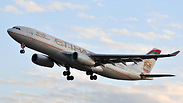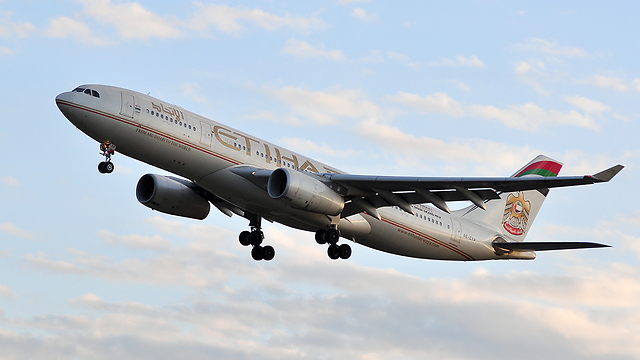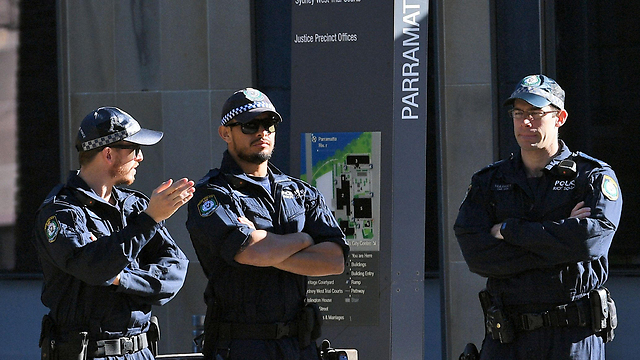Israel's Military Intelligence Directorate's (MID) Unit 8200 helped Australia thwart an attempt to bomb a commercial plane last year, the IDF cleared for publication on Wednesday.
"Unit 8200 provided exclusive intelligence that led to the thwarting of an airliner bombing by Islamic State (ISIS) at the end of 2017," an IDF statement said. "The cooperation with the Israeli intelligence community allowed for the transfer of information to the local security authorities and led to the arrest of the suspects, who were in the advanced stages of preparations and close to executing the attack. The foiling of the attack led to saving dozens of innocent lives and demonstrates that Unit 8200 is a player in the intelligence battle against Islamic State."
The thwarted attack was reported at the time both in Israel and abroad, but the intelligence agency that helped secure the vital information to prevent it has not been revealed until now.
In July 2017, an Australian man sent his unsuspecting brother to Sydney airport to catch an Etihad Airways flight carrying a home-made bomb disguised as a meat-mincer built at the direction of a senior Islamic State commander.
Khaled Khayat and Mahmoud Khayat, who have been charged with terror-related offences, also planned to build a device to release poisonous gas in a public area.
High-grade military explosives used to build the bomb were sent by air cargo from Turkey as part of a plot “inspired and directed” by the militant Islamic State group, but the bomb never made it past airport security, according to police Deputy Commissioner National Security Michael Phelan.
“This is one of the most sophisticated plots that has ever been attempted on Australian soil,” Phelan said.
Police allege that one of the two men had been introduced to Islamic State by his brother, who they said was a senior member of the group in Syria.
Communication between the accused man and Islamic State began around April, police said. Under the instruction of the unidentified Islamic State commander, the men built a “fully functioning IED” (improvised explosive device).
One of the brothers was unaware that he was carrying a bomb, disguised as a commercial meat mincer, in his luggage, and tried to check it in at the airport, police said.
Such a device would work like a large grenade, exploding with enough force to blow a hole in an airplane, even if it went off in the cargo hold, said Professor Greg Barton, a security expert at Deakin University in Melbourne.
“I think the logic would be that you pack your explosives in and seal it up, and if someone does a quick physical inspection it just looks like what it is, a meat grinder, because it’s not electrical or electronic, it’s less likely to be suspicious.”
Police said there was “a little bit of conjecture” about what happened next, but it appeared one of the accused then left the airport, taking the luggage with him. The man’s brother boarded the plane and has not since returned to Australia.
“I want to make it quite clear - it never got near screening. I don’t want anyone to suggest that it ... penetrated airport security layers ... because it did not. It didn’t go anywhere near it,” Phelan said.
Israel working with Western nations to foil ISIS plots
In recent years, Israel's intelligence community has been working to uncover and thwart dozens of terror attacks planned by ISIS against Western targets around the world.The IDF's involvement in the West's fight against ISIS began in the early stages of the civil war in Syria. In 2014, a senior IDF official admitted to reporters that the MID provides intelligence on ISIS targets to the international elements battling the terror organization.
In an interview with Ynet around the time the attack had been thwarted, IDF Chief of Staff Gadi Eisenkot said, “Since our intelligence capabilities are the best in the area, and certainly in Israel’s close vicinity, we contribute to the effort to defeat ISIS and the Nusra Front. We do with this our allies, sharing intelligence to support this effort. We pass on information to countries when we know something is in the works (in those countries). The (Israeli) intelligence community greatly contributes to thwarting terror attacks in the Middle East and elsewhere around the globe.”
However, the MID also tried and failed to thwart some ISIS attacks abroad. "We're not going on philanthropic trips around the world," a senior MID officer said Tuesday. "Then, and today, it remains unclear whether the caliphate would be defeated."
The IDF is not quick to eulogize ISIS. Even though the organization was pushed out of Syria and Iraq and suffered defeat in its aspirations to establish a geographical Islamic caliphate, some of its members were able to flee Syria to other place. This led Israeli intelligence agencies to increase the manpower keeping tabs on ISIS.
Thwarted Iranian cyber attack against Israel
The MID, together with the Cyber Defense Division in the Computer Service Directorate, also thwarted an Iranian attempt to launch a cyber attack against private and public bodies in Israel.
"This was made possible thanks to close monitoring of the Iranian apparatus and early identification of offensive attempts in Israel. Unit 8200, in an effort led by the Computer Service Directorate, actively works to identify the threat and effectively neutralize it," the IDF said.
A senior Unit 8200 explained that "a part of 8200 deals with operational activity beyond the borders. Our missions include incorporating offensive cyber tools as well as tools that help shape perception, alongside cyber defense. The cyber world has become a tool to achieve military and diplomatic goals. Today, it's not just about reaching arenas like Syria and Iran, but also to bypass technological giants without getting caught."
He said technologies and tools developed in the unit allowed Israeli forces to thwart dozens of terror attacks in the West Bank, mostly those planned by lone wolf terrorists. "We run advanced algorithmics in a technological machine that constantly learns and develops the more data you input," he said.





















